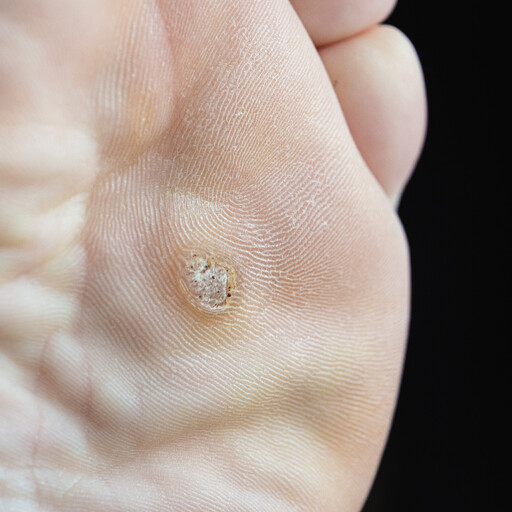Verrucae
Verrucae, sometimes called plantar warts, often develop on the bottom of the feet. The pressure from normal standing and walking tends to force the warts into the skin, and this can make the warts painful. Like all warts, they are harmless and may go away even without treatment, but in many cases, they are too painful to ignore. Verrucae that grow together in a cluster are known as mosaic warts
Signs & Symptoms
The symptoms of verrucae include:
Small circular growths on the soles of the feet, often containing tiny black dots.
The lesion will disturb the normal “finger print” striations of the skin
The lesion won’t contain the normal “finger print” striations of the skin
Verrucae are normally painless to push and painful to pinch
Pain in the soles of the feet that can happen when standing or walking.
Causes
Verrucae (or warts) are caused by a viral infection, commonly the Human Papillomavirus (HPV 2 and 4), sub groups types 1,3,26,29 and 57. They enter the skin through tiny incisions (micro-injury) that can occur when walking bare footed on grippy, non-slip surfaces that under a micro scope are covered in tiny sharp edges.
Like other viral infections, verrucae are contagious, and commonly spread from these grippy surfaces as often found in public swimming pools, communal showers, or even your shower at home. Epidemics of verrucae sometimes break out among people who share gym or athletic facilities or who engage in group activities where bare feet are the rule, such as swimming, yoga, Pilates and martial arts. Because most people build immunity to the virus with age, verrucae are more common in children than in adults.
Diagnosis
Sometimes telling whether or not you have a Corn or Verrucae can be difficult.
Our specialist podiatrist, Stefan, is highly qualified and experienced with over 30 years of clinical practice. His knowledge and experience enables him to offer a thorough, in-depth assessment of your condition.
As a rule of thumb, Verrucae are normally painless to push and painful to pinch
Once a diagnosis is determined; he will spend time to fully explain your condition, providing treatment options aimed at providing you with a range of treatment options.
Treatment
As with all foot and ankle disorders, your treatment will depend upon your diagnosis.
If your verrucae is painless, advice aimed at improving your immune system to enable it to resolve the infection are provided.
If your verrucae is painful and superficial, treatment including specialist, (very cold) Podiatric cryotherapy can be recommended.
If your verrucae is painful, over 6mm in diameter and surrounded by thickened dead skin, it may require gentle, painless surgical removal, as freezing or chemical treatment often isn’t enough to resolve the infection. You will normally experience little to no post-operative discomfort and can normally return to work the same day of treatment.
Sometimes patients present with a history of failed treatment or have experienced a sudden onset of multiple verrucae infections. In these cases further haematological investigations may be required to diagnose possible causes for poor immunity, immunosuppression.
Prevention
Verrucae (or warts) are caused by a viral infection, commonly the Human Papillomavirus (HPV 2 and 4), sub groups types 1,3,26,29 and 57. As will all virus, they are a part of the world’s environment that we all love and share.
At this stage there is no inoculation or effective disinfection process that can eradicate the verrucae virus/s.
Thankfully we can rely upon our own healthy, powerful and clever auto-immune system to defend us.
While this is often overlooked, a balanced healthy nutrition is vital. We are what we eat. A balanced healthy diet will give your body the building blocks, the necessary nutrition to maintain a strong auto- immune system. Professional advice from a nutritionist is recommended. Avoiding processed foods, sugar and alcohol will all assist your natural defense, in fact against all harmful pathogens including harmful bacteria, fungi and yeasts.
Try to ensure you get a good night’s sleep. Sleep enables your body to undertake cellular repair. A regular good night’s sleep routine will also assist your auto-immune defense system.

